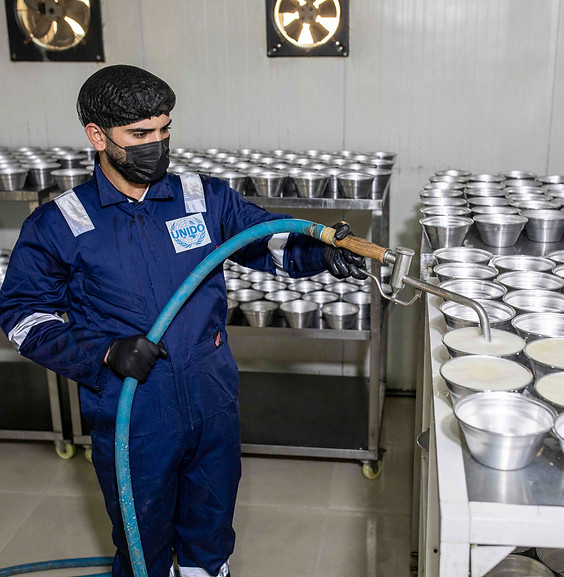
A Factory’s Transformation Samir’s Journey to Success with Japan and UNIDO
Samir Idris Mohammed-Ali, from Bardarash District in Iraq, managed a small yogurt factory named Badinan. Despite his hard work, financial stability seemed out of reach until the UNIDO project funded by Japan offered him vital training and new equipment, transforming his struggling business into a thriving enterprise. Now, with enhanced skills and upgraded facilities, Samir envisions more growth and security for his family's future.
.jpg)
Guljin
Guljin is originally from Qamishli, northern Syria, but now lives in a refugee camp in Akre, northern Iraq. Guljin left Syria on April 20, 2013, two years after the conflict broke out. She and her brother went to Duhok to visit a sister who was married and had been living in the northern Iraqi city for years. They traveled with the plan of not returning. Guljin, her brother, and his wife and children were settled in Akre camp in central Akre, a former military barracks built during the time of Saddam Hussein.

Hadi
Hadi quit school at the age of 12 and went to work to help support his family, finding odd jobs on construction sites or in factories. When ISIS attacked in 2014, he and his family fled on foot. They walked for seven days to the border with Syria and then north to Zakho. They lived for a year in an unfinished building before an aid organization moved the family to a tent in Sheikhan camp.

Hazhar
Hazhar is originally from Qamishli, Syria. He grew up helping his father, a carpenter. He then chose to study industrial design and mechanics in school. When he graduated, he didn’t find work in his chosen field, but had a car so worked as a driver. In 2014, he was driving a regular route between two cities in northeastern Syria, taking passengers in a minibus. One day, four Syrian army soldiers were among his passengers when the minibus was stopped by Islamic State group (ISIS) militants. They released the women passengers, but detained the four soldiers and Hazhar.

Sharifa
Sharifa and her family are originally from Sinjar. For more than six years, they have lived in Mamilyan Camp for internally displaced people, near Akre in the Kurdistan Region of northern Iraq, after fleeing the Islamic State group. The chickens, 17 laying hens and two roosters, were given to them in March by the United Nations Industrial Development Organization (UNIDO), part of a project to provide a source of income and food security to 40 families in the camp.
.jpg)
Shahnaz
In 2018, when bombardments started to come too close to their home in north-eastern Syria, Shahnaz and her husband decided they needed to bring their children somewhere safer. Shahnaz’s husband was ill, however, and the family didn’t have enough money to bring everyone across the border into the Kurdistan Region of northern Iraq. They had to make the difficult decision for Shahnaz to take the children and make the difficult trip alone. The youngest was just 2 months old at the time.

Chicken Coop at Gawilan Camp
This agri-business project provides food sustainability to Kurdistan’s most isolated refugee camp. Syrian refugees selected for food sustainability and livelihood projects in the Kurdistan Region of Iraq’s (KRI) most isolated refugee camp have begun receiving eggs from chickens they received as part of a UNIDO project which began last year.
.jpg)
Supporting sweets producers in Syrian refugee camps
UNIDO offers training sessions to boost economic and food security for refugees living in the Kurdish Region of Iraq. Darashakran Camp is one of the sites where those involved in food production -- from farmers to household producers to small-to-medium enterprises – are being taught about hygiene and safety and given the know-how to bring their products to the market.


